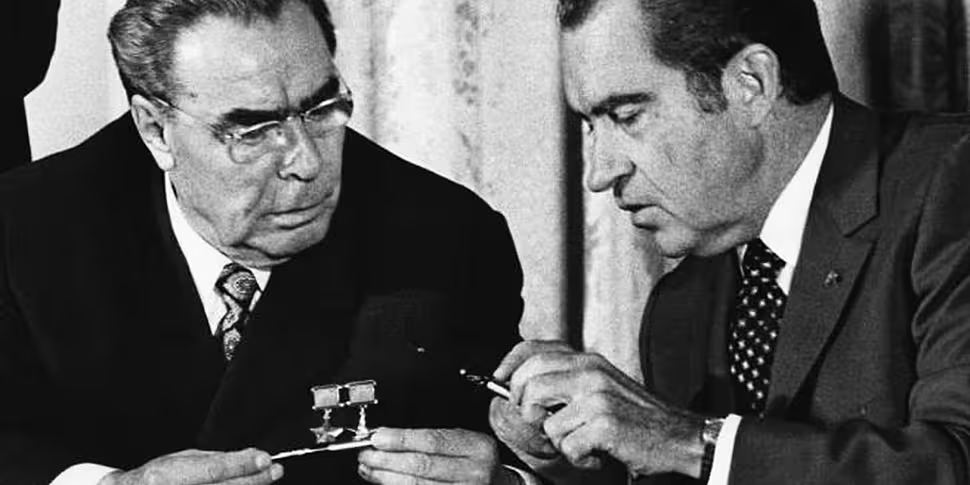During the 1970’s, the United States and the Soviet Union experienced a thaw in relations that became known as détente. The reasons for this period of détente were wide reaching. Increased tensions between Soviets and the Chinese played a part. This was at a time when the US were making attempts to foster better relations with the Chinese, exemplified by Nixon’s meeting with Mao in 1972. The emergence of a third power at this time upset the balance of the bipolar world, causing the Soviets and the US to re-evaluate their policies.
Additionally, a slight shift in global economic power saw the relative decline of the US in comparison to their European neighbours, who were prospering under the EEC. Also, the failure of American foreign policy in Vietnam led to a general opinion within the US for an approach more concentrated on domestic policies which had been largely ignored for the previous decade.
This was manifested in the election of Nixon, whose policies oversaw this change in international relations to a calmer, more tolerant America. There was also an element of realism to this new departure in friendly relations, as the Soviets nuclear capabilities were now much greater and effectively equal to the US, meaning there was an increased need for negotiation on this issue.

Nixon and Mao in his visit to China, 1972
However, from a Soviet perspective, there were internal influences for their involvement in détente. Challenges from within the Soviet bloc had occurred, such as the uprisings in Hungary and Czechoslovakia, which were promptly quashed by the Soviets.
The decade of détente was marked by a series of summits held between both sides and the number of treaties agreed to during this time. These were most famously on the issue of arms control, with the signing of SALT I in 1972 and the negotiations on SALT II for the remainder of the decade. They also cooperated on economic issues though, as trade and industrial relations were developed during the period.
However, both nations continued to be strong players in world diplomacy, and a certain level of feistiness still remained. Often, they were played out through various political conflicts throughout the third world, as both sides provided support for their respective allies, with the aim successfully implementing their own ideology.
There are many arguments that can be put forward to support the ideal that détente marked the beginning of the end of the cold war. It did seem apparent that the USSR was less forthright in its foreign policy in the years after the end of détente, leaving the US to establish superiority in this respect. This weakness was demonstrated in the Communist party by the unsettled leadership in this period. As Brezhnev, Andropov and Chernenko were at the helm before Gorbachev took control in 1985. Perhaps, it is not too drastic to comment that it is thanks to détente that the Soviet Union survived as long as it did.

Nixon and Henry Kissinger, US Secretary of State, with Egyptian Foreign Minister Ismail Fahmi, 1973
Despite this compelling evidence, as is the norm in history, it is never as simple as it appears. 1983 marked a year of heightened hostilities that would match up against any other in the Cold War period; with the Soviets shooting down Korean Airlines flight 007, killing all on board, including American citizens.
Similarly, the US was preparing to enter Grenada in the wake of Soviet activity in the region. Basically, the period of détente had done little to quell any friction between both parties. At the beginning of the 1980’s it seemed the Cold War was no closer to conclusion than it had been at any time since its outbreak. The signs became more prevalent as the 1980’s progressed, but there was no benefit of hindsight available as détente ended in December of 1979.
Join Patrick and his panel of experts as they unravel this period of detente. What motivated Nixon to engage with Brezhnev, the Soviet leader? Did these friendlier relations extend to other problematic world powers? And how significant was this era in the context of the Cold War?









